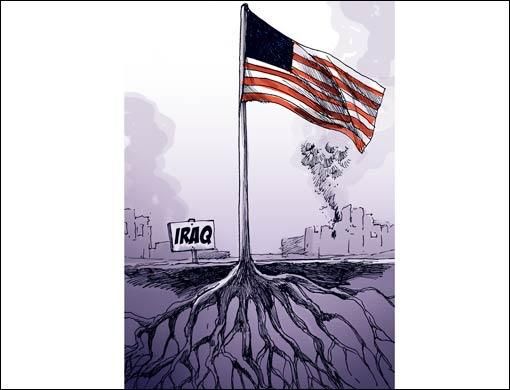Last week, almost unnoticed, the war in Iraq entered a new phase. Laconic statements from the White House and the Pentagon confirmed what had long been suspected - namely that the US is planning a long-term military presence in Iraq.
This is a geopolitical development of the first importance. It is a clear statement that, in spite of its current difficulties in Iraq - May was the most lethal month since 2004 for the US, with 119 soldiers killed - the US firmly intends to maintain control of Iraq and its vast oil reserves. Iraq's neighbours and energy-hungry states and oil companies will take note.
On a visit to the US Pacific Command in Honolulu last Thursday, Robert Gates, the US Defence Secretary, said that the US was looking for a "long and enduring presence" in Iraq under a mutually agreed arrangement with the Iraq government.
"The Korea model is one, the security relationship we have with Japan is another," he said. US troops have been in South Korea since the end of the 1950-53 Korean War and in Japan since the end of the Second World War.
Last week, the White House spokesman, Tony Snow, confirmed that President George W. Bush wanted to see a lengthy US troop presence in Iraq at the invitation of the host government. "The situation in Iraq, and indeed, the larger war on terror, are things that are going to take a long time," he said.
Such statements, and the military planning which goes with them, clearly pre-empt and make nonsense of the current US debate - in Congress, the press and the public - about whether or not the US should announce a date for its withdrawal from Iraq, and whether or not the current "surge" in troop numbers is producing positive results. The Bush Administration is looking way beyond that.
What are the motives driving such long term ambitions? The wish to retain control of important energy resources in the face of potential rivals such as China is clearly one of them. If there were no oil in Iraq, the US would not be there.
Another motive is the ability to project US power over the whole of the oil-rich Gulf and, beyond, to a vast area from Central Asia to East Africa. Other motives include confronting hostile Iran and Syria, making up in Iraq for the loss of bases in Saudi Arabia and, not the least motive, being at hand to protect Israel in case of need. These were indeed the main reasons the US invaded Iraq over four years ago and smashed the Iraqi state.
Seen in this light, for all the talk of promoting stability and democracy, the US enterprise is an unmistakable neo-colonial or imperial project such as the region suffered at the hands of Britain and France in an earlier age
Former US president Jimmy Carter -a stern critic of the Bush Administration - was prescient when he declared on February 3, 2006:
"There are people in Washington ... who never intend to withdraw military forces from Iraq and they're looking for ten, 20, 50 years into the future ... the reason that we went into Iraq was to establish a permanent military base in the Gulf region, and I have never heard any of our leaders say that they would commit themselves to the Iraqi people that ten years from now there will be no military bases of the United States in Iraq."
Are these US ambitions realistic? Or will they simply pile up problems for the United States, exacerbating its already deplorable relations with much of the Arab and Muslim world?
A former Centcom commander, General Anthony Zinni has described the establishment of permanent bases in Iraq as "a stupid idea and clearly politically unacceptable. It would damage our image in the region where people would decide that this was our original intent".
As early as 2004, Jessica Mathews, president of the Carnegie Endowment for International Peace in Washington, denounced permanent bases as a "disastrously bad idea" which reinforces Iraqi suspicions that the US launched the war to get a hand on Iraqi oil, control the region, and maintain a puppet government in Baghdad.
Mammoth
Yet, military base building by the US in Iraq continues apace at a cost of over $1 billion a year. In the years since the invasion, there have been numerous journalistic accounts of the mammoth bases the US has built, and continues to expand, in Iraq. There is the giant Al Balad base covering 14 square miles, some 40 miles north of Baghdad, formerly the Iraqi Air Force Academy. There is the even bigger Al Assad base covering 19 square miles; the Al Tallil base; the Al Sarq base; the Al Qayyarah base in the north and many others.
Shortly after its invasion, the US established 110 bases in Iraq. The present plan seems to be to consolidate these into 14 "enduring bases" in Iraqi Kurdistan, at Baghdad airport, in Anbar province and in the southern approaches to Baghdad.
The construction of a US embassy able to house 1,000 staff on a 100 acre site on the banks of the Tigris - the biggest US embassy in the world - does not point to an early US disengagement from Iraq.
Patrick Seale is a commentator and author of several books on Middle East affairs.













